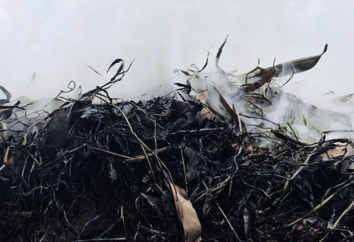To close out International Compost Awareness Week we've gathered some lesser known but none the less fascinating facts about composting.
Hopefully you're well aware how composting improves soil, reduces chemical fertilizer use, and keeps moisture in the ground, but did you know....
Compost piles can combust…spontaneously!
 Fortunately, this is rare, but it is a fact worth remembering! This "spontaneous combustion" is more likely to occur in large, well-insulated piles with limited airflow, such as those used for storing hay or woodchips. Small domestic compost heaps are less prone to this issue.
Fortunately, this is rare, but it is a fact worth remembering! This "spontaneous combustion" is more likely to occur in large, well-insulated piles with limited airflow, such as those used for storing hay or woodchips. Small domestic compost heaps are less prone to this issue. Reference: Biocycle
Compost piles aren’t only made by humans

In Australia, the brush turkey builds huge mounds of vegetation as a “composting nest”, and the heat produced as it breaks down incubates their eggs for them! But only the best composters get to breed, as the female brush turkeys choose their mates based on how good their composting nest is.
Reference: Cornell Composting; FindMyAustralia
Image Credit: Berowra Backyard
Cooking in compost really is a thing!

Large compost piles can maintain temperatures of 50°C-70°C, and that heat can, and has been used for cooking (we recommend wrapping securely in silver foil first though). Those temperatures are hot enough to poach an egg, stew rhubarb, and even cook a steak! There are even some high end restaurants that are experimenting with compost cooking.
Reference: Kat's Garden, BuzzFeed, Bon Appetit
Compost makes you happy

M. vaccae, a living creature that resides in your backyard compost pile, acts like a mind-altering drug once it enters the human body, functioning like antidepressant pills to boost your mood. You really can get high on compost!
Reference: The Atlantic
Compost can be used to heat hot tubs

A compost pile actually generates enough heat to warm up a hot tub. When organic materials like wood chips, leaves, and yard waste decompose in a compost pile, they release heat due to the activity of microorganisms. The temperatures actually get high enough (between 57°C and 71°C) that this heat can be captured and utilised as a water heater. This process even has an official name - The Jean Pain method.
Reference: Waldon Labs
Composting Started Thousands Of Years Ago

Archeological evidence suggests that composting dates back to the Neolithic age 12,000 years ago.
In ancient Egypt (50 BC) the value and skill of earthworms in composting was recognised by declaring them sacred, making their removal from Egypt a serious crime.
Reference: SCARAB International; Compost Magazine
Image Credit: British Library
The role of worms is more significant than you realise

Composting is an amazing process that destroys pathogens in both the hot and cold parts of the composting process.
Worms play their part. Not only can they eat their own body weight in a day, producing highly beneficial worm castings in the process, they can assist with reducing and even eliminating harmful bacteria such as e-coli.
Also did you know that worms have five hearts, no teeth and no eyes. And, if you cut a worm in two it will most likely die despite the popular urban myth to the contrary.
Reference: Oxford Academic; Science Direct; Bokashi Living
You can use cockroaches instead of worms

Traditionally it has been advised to keep cockroaches out of your compost but they can be surprisingly helpful and effective composters, breaking down food scraps in a unique form of composting called blatticomposting. Amazingly cockroaches will eat anything and everything you put in your compost, they reproduce like crazy and have virtually NO SMELL. There are even special breeds available now which can't climb to minimise the risk (horror) of them escaping the compost container!
Reference: Compost Magazine
Your compost likes a drink or two as well

Also known as "drunken composting" it has nothing to do with becoming intoxicated but refers to accelerating the decaying process by adding beer or wine to your compost pile. The neighbours might think you’ve lost it but even though wine and beer contain alcohol but they also contain yeast and sugar, which is like a prime buffet for the bugs who make your compost so yummy for plants. This method is so effective it can shorten the process to weeks instead of months.
Reference: Let's Go Compost; Gardening Know-How
Your compost is full of life
A single teaspoon of compost can contain more microorganisms than there are people on Earth!
Reference:
So there you have it. Composting is even more amazing and interesting that you first thought.





